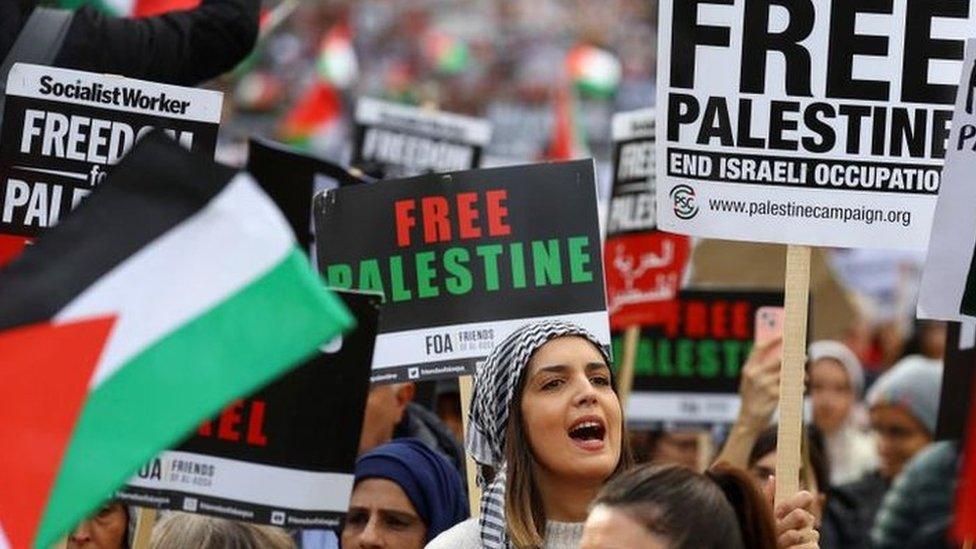Anguished UK Palestinians grieve for loved ones in Gaza
- Published
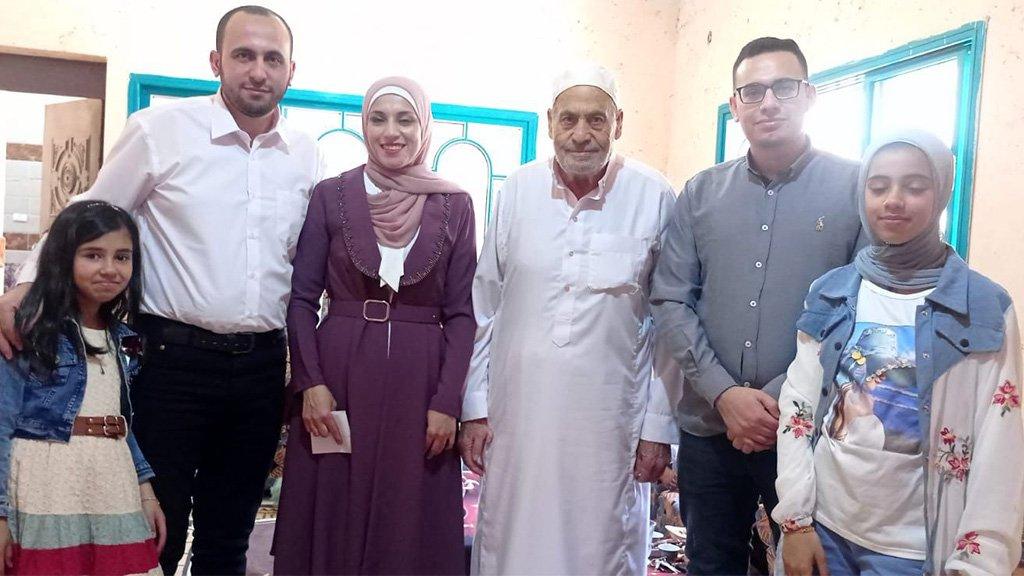
Six of the 20 members of Ahmed Alnaouq's family who were killed in one Gazan bombing
It was 04:30 on Sunday 22 October when Ahmed Alnaouq suddenly woke. He normally slept well, but he'd had a feeling something was wrong.
He glanced at his phone and saw lots of WhatsApp messages from friends back home in Gaza - all now erased and replaced with "This message has been deleted." Mr Alnaouq, confused, messaged one of them back from his home in London. The response - "Are you good?" with no explanation for the deleted texts - made him feel more uneasy. Ahmed called, and his friend broke the news.
Mr Alnaouq's father Nasri, three sisters, two brothers, a cousin, and 13 young nieces and nephews - 20 members of his family - had been killed by an Israeli air strike. He felt something worse than devastation - a feeling so awful he didn't have a word for it. His father, he said, was the person he "loved most in his life".
Most of the family had lived together in his father's home, where Mr Alnaouq himself was born. His three sisters had moved in temporarily for their own safety, because the house was south of the Wadi Gaza river.
But shortly after ordering civilians to shelter in the south, the Israeli military continued to target the area. It said it was striking a series of Hamas targets.
"Israel instructed people to go there because it was safer," Mr Alnaouq said. "Then they bombed it."
Ahmed Alnaouq moved to the UK four years ago after getting a scholarship to study for a master's degree at the University of Leeds. He now runs the organisation We Are Not Numbers, which pairs Palestinian writers with mentors in the West. He hadn't been able to see his father since leaving Gaza.
"I always said to myself that if something happened to my father before I was able to see him again, I would never forgive myself."

More on Israel-Gaza war
Follow live: Latest updates
Watch: Video said to show Al-Quds hospital after nearby blast
Explained: What is happening in Israel and Gaza, and why now?
History behind the story: The Israel-Palestinian conflict

For Mr Alnaouq, he has not just had his family ripped away - he has also been denied the ability to grieve.
"Usually when someone loses a family member, they will be able to go and attend their funeral, kiss them goodbye, see their faces for the last time," he said.
"But they are thousands of miles away. Still, after a week, nine of them are under rubble. No-one can take their bodies out from under the rubble. I don't know how to describe it, but I feel like my heart is torn."
He is one of many British Palestinians who, despite being 2,500 miles (4,000km) from Gaza, are feeling the war intensely.
Those whose relatives have survived the bombings are trying to track their family members' movements remotely, and to push for action from those in power. They're watching the war unfold on TV and their phones, while trying to remain hopeful that their loved ones are safe.
Basma Ghalayini, 40, is one such person. She is currently dealing with the intense anxiety of not knowing how her relatives are faring. Ms Ghalayini is in Manchester, but her brother and sister travelled to Gaza in September to visit their parents who work there.
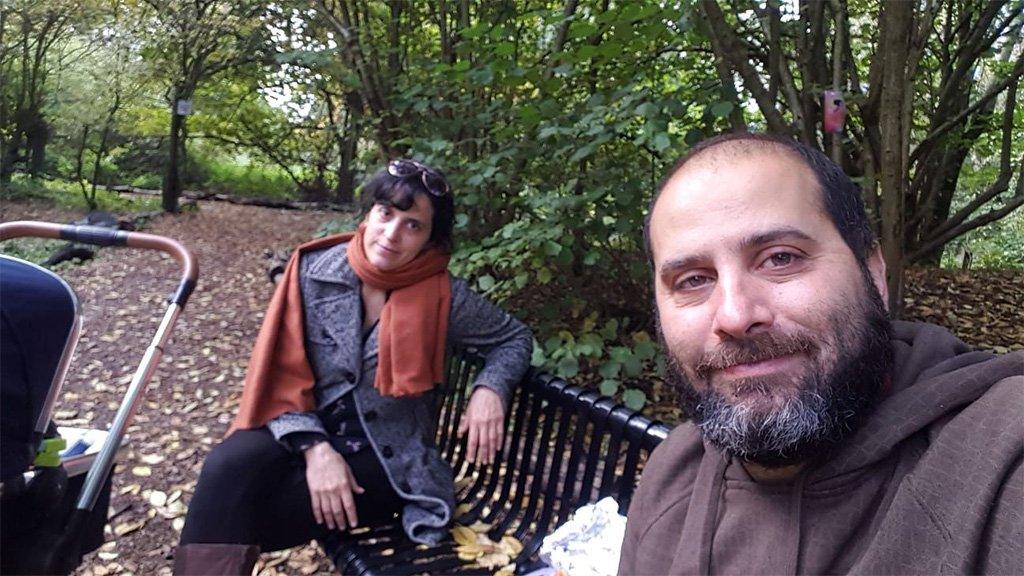
Basma Ghalayini is trying to track her brother Mohammed's (right) movements
When Hamas launched their attack on southern Israel on 7 October, Ms Ghalayini's mother was immediately concerned about the potential dangers to Basma's sister, who has a health condition and is reliant on certain medication.
"So she quickly took [my sister] to the Egyptian border and headed to Cairo. They made it through. The borders closed the very next day."
Ms Ghalayini's brother Mohammed and their father stayed in Gaza, moving to Khan Younis in the south when Israel gave its evacuation order.
Aside from the risk of deadly rockets, water and food supplies are running extremely low. The UN has warned that civil order is "starting to break down".
Power in Khan Younis is also extremely limited. Ms Ghalayini said Mohammed had had to queue for five hours to charge his phone from a car battery.
For this reason, she said, she doesn't want to waste her brother's battery by texting him a lot. Instead, she asked him to switch on his "last seen" status on WhatsApp.
But that connection is fragile. On Friday evening, Israel launched strikes of a scale and intensity never seen before. Connectivity from Gaza was cut off almost completely. Their loved ones in the UK waited anxiously for Gaza's internet to return.
It was then another 42 hours before Ms Ghalayini finally heard from Mohammed.

While this is the most intense escalation of the conflict in recent years, for Palestinians and the diaspora, the pain they're feeling now is not new.
Ms Ghalayini told me her six-year-old daughter and three-year-old son already know what bombs are.
"It's all part of being Palestinian," she explains. "Any Palestinian child will know, because it's part of our lives."
But when her daughter asks if her uncle and grandfather are safe, she tells her, "Yes, they're safe."
"I have to," she said. "She'll just get worried."
Karim Ali's colleagues literally bear the scars of Israel's previous attacks on Gaza.
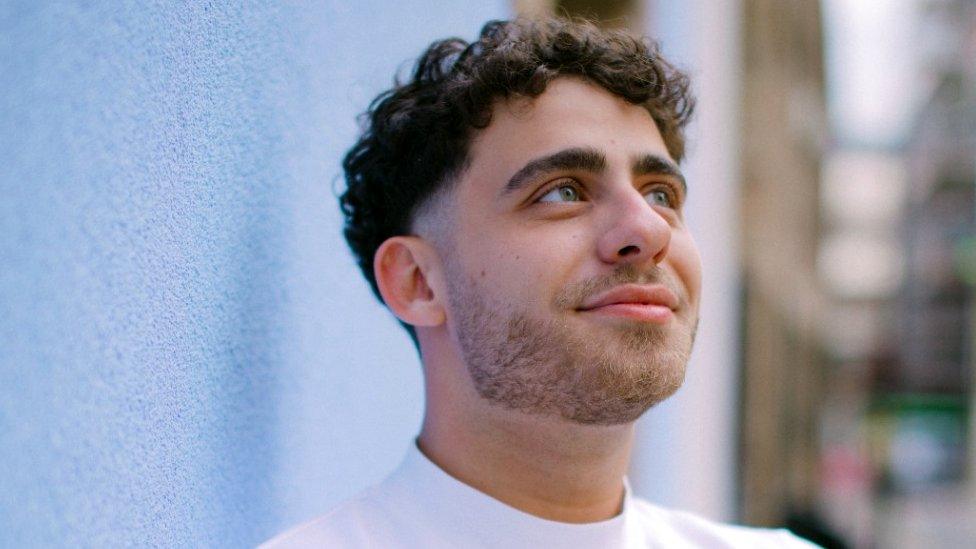
Karim Ali says he has been disappointed by UK politics but sees hope in the nationwide marches
The 24-year-old from London works with a para-cycling team based in Gaza called the Gaza Sunbirds. Everyone in the team lost their limbs in previous bombardments.
He said that he had been talking recently to one of the athletes who had been gathering body parts from those killed in the current violence.
"We're talking about an amputee on one leg having to go around to gather the body pieces of people from the building next door, because there's no one else to clear the rubble."
There's also a feeling of frustration closer to home.
Ms Ghalayini said she feels let down by the UK media, including the BBC. She said she disagrees with some of its terminology, such as it sometimes referring to the "Israel-Hamas war".
"It's heavily misleading," she said, as thousands of Palestinians had been killed, including children - "none of them affiliated with Hamas".
Mr Ali said he feels his community isn't always treated with respect by politicians or the media, citing what he sees as their tendency to make Israel's attacks on Gaza seem "justified and targeted".
"We're doctors, we're teachers, we're lawyers, we're politicians, we're academics, we're volunteers," he said. "I came to this country to study, I started a food bank, I started a mutual aid group during the pandemic. I've contributed to the culture of this country.
"Why are we being treated like we're nothing? Why are we being dehumanised?"
But for both Ms Ghalayini and Mr Ali, the overwhelming show of support from people who've gone on marches across the country has left them with some hope.
While Basma Ghalayini worries they risk being a bit of an "echo chamber", she said the marches help her feel "reassured".
"It makes me feel that there are people who are there for us, supporting us."
Related topics
- Published13 October 2023
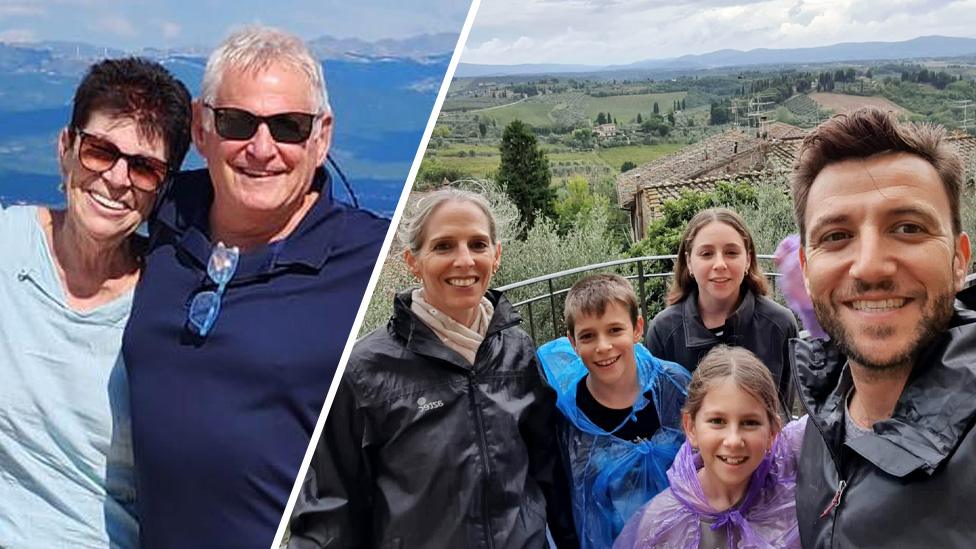
- Published28 October 2023
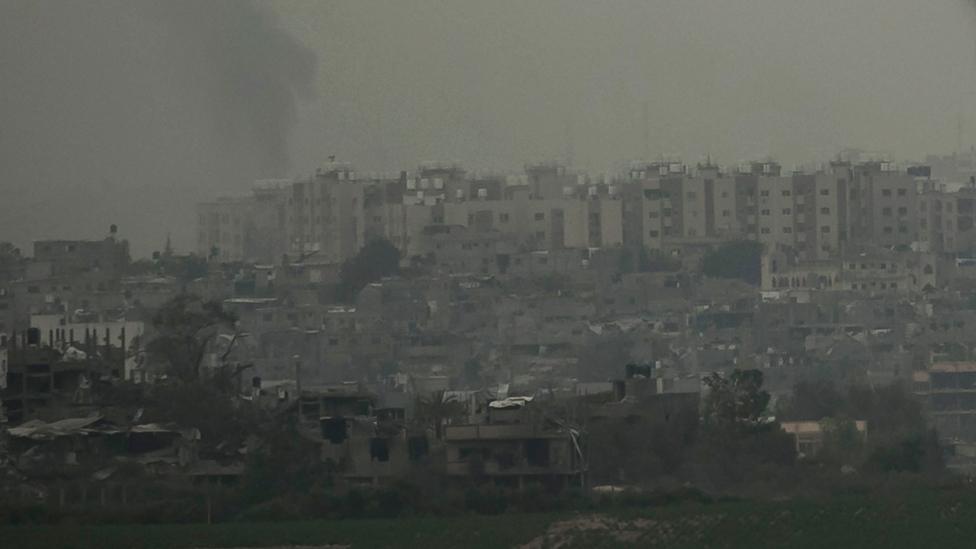
- Published22 October 2023
